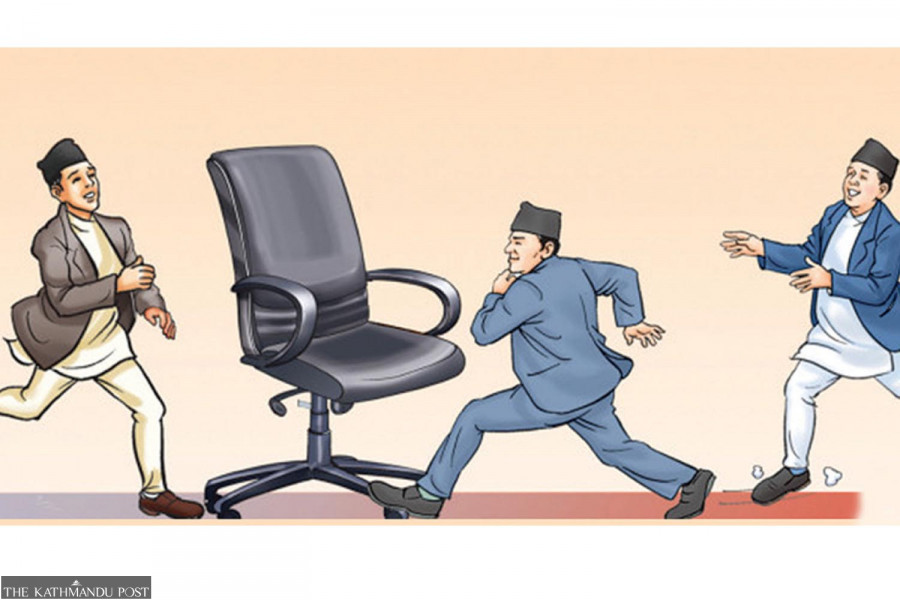Politics
Parties busy politicking have no time for people
Last year, politicians spent time putting together election coalitions. This year, they are caught up in power politics.
Purushottam Poudel
Jhanka Shrestha, 55, a permanent resident of Ranibari in Kathmandu, runs a pharmacy. Shrestha, who has been in the business for the past 30 years, provides for his family with whatever he earns by selling medicines. But the recent economic downturn has hampered his business and taken a toll on the earnings, he complains.
Shrestha says the politicians in charge of the country’s affairs are paying little attention to improving the national economy, which was first battered by the global pandemic and by the Russia-Ukraine conflict since last year.
“Leaders often hold their meetings only to discuss who gets what positions, while putting people’s issues on the backburner. Why don’t they focus on public welfare?” he questioned. “We voted in the November elections hoping that things would improve, but we have been proved wrong once again.”
Rameshore Khanal, a former finance secretary, says political dysfunction overshadowing people’s day-to-day issues is a problem not just in Nepal but all over the developing world.
This time last year, political parties were discussing possible dates for local elections. The polls in 2017 were held in three phases: May 14, June 28, and September 18.
However, the Election Commission as well as some law experts then argued that since the local elections (first phase) were held on May 14, 2017, there should be a new set of elected representatives—mayor/chair, deputy mayor/deputy chair, ward chairs, two women ward members and two other ward members in each local unit—by May 29, 2022.
But there was also the argument that the local representative elected in the third phase (September 18) would not be able to complete their five-year tenure. Amid these conflicting arguments, the local elections, second since the country adopted a new constitution in 2015, were eventually held on May 13 last year.
Soon after the local elections, the parties, especially the five-ruling alliance —Nepali Congress, CPN-Maoist Centre, CPN-Unified Socialist, Janata Samajbadi Party and Rastriya Janamorcha—were again engrossed in seat-sharing for the federal and provincial elections scheduled for November 20 in the year.
After this seemingly endless election mode the country found itself in, the political parties were soon busy haggling for power.
First, a dispute over who should become the prime minister split the ruling five-party coalition which had contested the local and general elections as an alliance. A new alliance of seven parties with the CPN-UML and the Maoist Centre as key partners was born. The alliance anointed Pushpa Kamal Dahal, chair of the Maoist Centre, as the prime minister on December 25.
But the Dahal government is already in trouble as its coalition parties find themselves divided over the candidate for new President.
“The problem with politics under a capitalist economic system is that the public agenda seldom gets the priority,” Khagendra Prasai, associate professor of philosophy at the Nepal Open University and a political analyst said. “We cannot expect the parties that so blatantly ignored public issues during elections to suddenly start caring about the same public after coming to power.”
Though the Dahal-led government has directed various government departments for effective service delivery, experts find such directives meaningless in the absence of proper implementation and regular monitoring.
“I recently travelled to some districts outside the Kathmandu Valley and found people everywhere frustrated with the state of politics and the economy,” Khanal, the former finance secretary, told the Post. “People share their tales of misery and how the politicians and the government have failed them.”
One key issue the country currently needs to address is the economy. Inflation has picked up. The poor in far-western districts of Dadeldhura, Bajhang, Achham, Bajura and Darchula, among other regions, are burdened by exorbitant loans from microfinance companies. Unable to repay the loans, some have killed themselves while many others have fled their villages. But the rulers in Kathmandu appear unfazed.
The markedly low turnout in last November’s federal and provincial elections hinted at the growing public frustration with the political parties. As per the report of the Election Commission, just 61 percent of voters exercised their franchise last November.
The election of independent mayoral candidates like Balen Shah and Harka Sampang last May and the emergence of new political outfits like the Rastriya Swatantra Party, which won 20 seats in federal elections, suggest the public’s patience with traditional parties is running thin.
“The parties have not learned from their previous mistakes,” sociologist Guman Singh Khatri said. “Public frustration is already high and could soon burst out.”




 18.12°C Kathmandu
18.12°C Kathmandu















